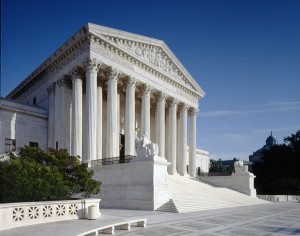 In arguments at the Supreme Court Monday, justices appeared skeptical about patenting human genes.
In arguments at the Supreme Court Monday, justices appeared skeptical about patenting human genes.
The U.S. Patent and Trademark Office has been granting parents on human genes for nearly 30 years. This is the first case questioning that premise to reach the Supreme Court. At the heart of the case are two genes associated with breast cancer, BRCA1 and BRCA 2. People with certain mutations in these genes have a significantly higher risk for breast, ovarian and other cancers.
Opponents of patenting human genes say genes are products of nature and therefore cannot be patented. Myriad Genetics, which holds the patent on the genes, say that once genes are isolated from the body and processed they are no longer a product of nature.
The Associated Press captured the back and forth:
Justices attempted to break the argument down to an everyday level by discussing things like chocolate chip cookies, baseball bats and jungle plants.
[Gregory A.] Castanias, the Myriad lawyer, argued that the justices could think about the gene question like a baseball bat. "A baseball bat doesn't exist until it's isolated from a tree. But that's still the product of human invention to decide where to begin the bat and where to end the bat," he said.
That didn't work for Chief Justice John Roberts.
"The baseball bat is quite different. You don't look at a tree and say, well, I've cut the branch here and cut it here and all of a sudden I've got a baseball bat. You have to invent it, if you will," Roberts said. "You don't have to invent the particular segment of the strand. You just have to cut it off."
The court moved on to body parts. Said Justice Sonia Sotomayor, "If you cut off a piece of the whole in the kidney or liver, you're saying that's not patentable, but you take a gene and snip off a piece, that is? What's the difference between the two?"
Castanias tried again, comparing the company's patented genes to medicine.
"It's important to note that molecules have been patented for a very long time. That's what drugs are. And drugs are often made by taking one molecule and another molecule, both of which are known, reacting them in a test tube," he said. "Reactions have been around 100 years just like snipping has been, but they make something new and useful and lifesaving from that."
Roberts still wasn't convinced. "Well, I don't understand how this is at all like that, because there you're obviously combining things and getting something new. Here you're just snipping, and you don't have anything new, you have something that is a part of something that has existed previous to your intervention," he said.
The ACLU filed its lawsuit against Myriad in 2009. According to the AP, U.S. District Judge Robert Sweet invalidated the patents. But a federal appeals court reversed him in 2011, saying genes are indeed patentable. The Supreme Court first sent the case back to lower courts for rehearing. The federal court again upheld Myriad's patents last August. And that's where we are today.